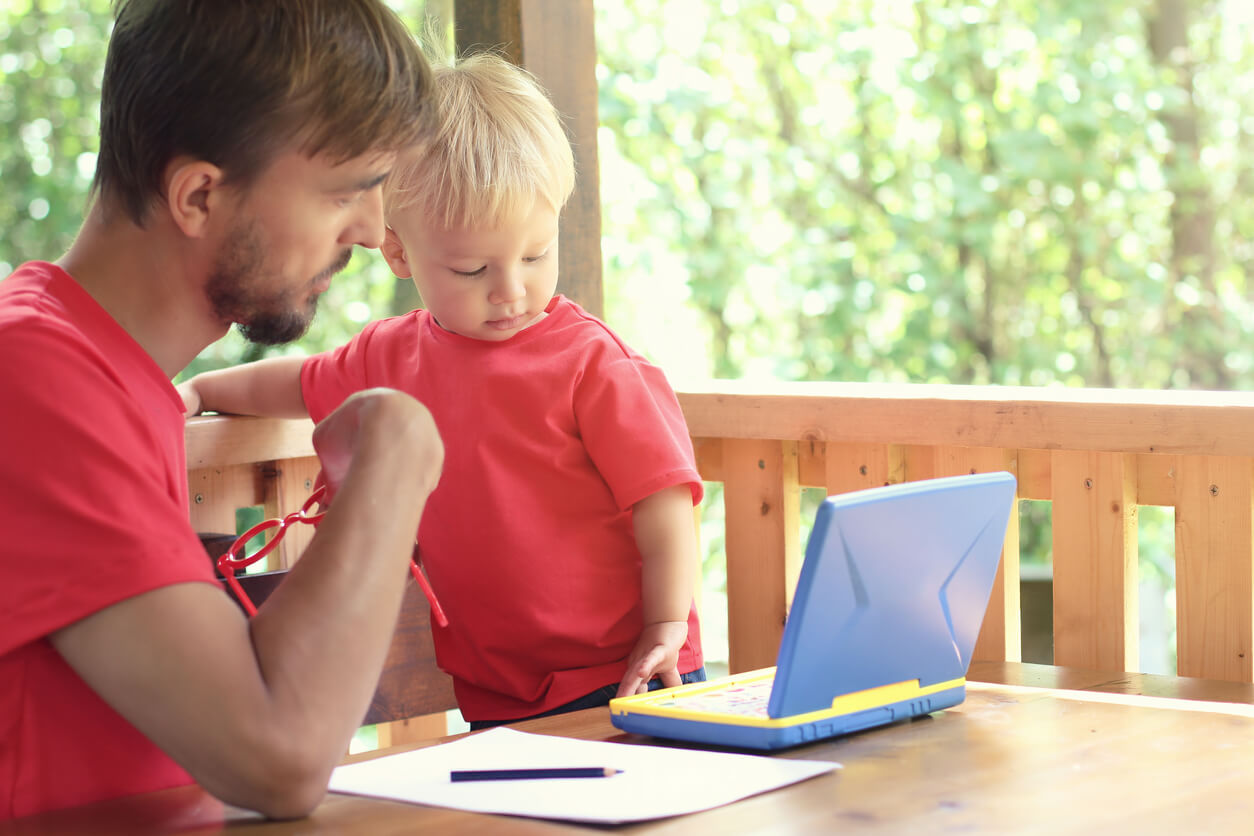The Unschooling Movement: What Is It?


Written and verified by the psychologist Elena Sanz Martín
Do you remember your school years? Without a doubt you can still remember a sense of laziness, apathy, boredom, and the feeling that learning and studying were obligations. Don’t blame yourself, this is what happens when the education system doesn’t respect the natural processes and rhythms of children. With this in mind, the unschooling movement is an approach that solves many of these difficulties based on the innate curiosity and motivation of little ones when it comes to training and preparing them for life.
Traditional educational models treat children like passive agents to be directed, like empty vessels to be filled by a trained adult through the application of a structured plan. Therefore, the aim is to transplant content to children’s minds as a mere formality and often without them knowing the usefulness or interest of what they’re learning. The result? Children memorize the information for short periods of time without understanding what they’re studying and, once the evaluation is over, they forget what they’ve learned.
The unschooling movement breaks away from these paradigms and puts the child back at the center of the process by giving them a leading role and adapting teaching to their needs.
What is the unschooling movement?
This term means “no school”, thus, schools, teachers, curricula, and exams are removed from the equation. The approach is quite different: Children learn through everyday experiences that spark their interest and are driven by their own intrinsic motivation. This way, they’re freer and more autonomous and follow their own rhythms.
At first glance, this may seem far-fetched; however, think about how children acquire their mother tongue. No one structures a series of theoretical and practical classes to teach it to them. Through mere exposure and by being immersed in an environment that speaks to them, they end up learning the language naturally.
Similarly, you can think of a situation that has probably happened to you with your children. They’re not able to finish the book that’s been sent home from school, but they devour their favorite saga; they can’t manage to complete that essay they’ve been assigned as homework, but they have fun writing their own stories and tales. And, most strikingly, they put off studying for an exam as long as possible while they spend hours searching for information they find interesting about planets or dinosaurs.
The fact is that learning isn’t the same when it’s forced, structured, and evaluated as when children have the freedom of wanting to learn something because it really interests us prevails.

Characteristics of unschooling
To summarize the essence of this educational approach, here are its main characteristics:
- The child occupies the central role and is the protagonist in their learning. There’s no older person who tries to force the acquisition of knowledge, but rather the child directs the process and asks questions according to their curiosity and interests. The adult accompanies, guides, orients, and responds.
- Children’s rhythms are respected and learning isn’t rushed.
- Life itself serves as school. As the child has diverse, interesting, and enriching experiences, they acquire knowledge, and their curiosity and motivation to learn more increase.
- There are no evaluations or exams. Learning isn’t an obligation but a right, so no one is judged.
- The child decides what they want to learn as the need arises. This way, they know the usefulness of each piece of information they acquire and understand how to apply it in life. This ensures that learning is meaningful and that it lasts over time.
Is the unschooling movement an effective alternative?
As it’s such a groundbreaking proposal, it’s normal to have doubts about it. Therefore, it’s important to consider its pros and cons. First, it offers multiple and important advantages and benefits, such as the following:
- Children grow up with more freedom, more autonomy, and more confidence. They’re in touch with their interests and concerns, are more reflective, and know themselves better.
- They’re more independent and know how to guide their own learning, ask pertinent questions, and learn in a practical way through experimentation.
- The learning they acquire is solid and endures over time. Although at their own pace, children eventually learn everything they need to know. They’re nurtured and mentally cultivated by their own interests.
- They enjoy their childhood more and their relationship with their parents is stronger. If they’re in charge of their unschooling education, they’ll share a multitude of enriching experiences and meaningful moments.
- By eliminating schooling and testing, the pressure of being judged, evaluated, and compared is reduced. In addition, certain problems such as bullying or harassment by teachers are avoided.

The disadvantages of this educational approach
On the other hand, there are also certain cons to take into account regarding this educational approach:
- By not attending school, the child loses the opportunity to interact with peers, learn how to relate to others, and solve social problems.
- If the child later switches to a traditional educational system, there may be problems adapting to group work, memorization, or a rigid and structured educational plan.
- If parents are in charge of unschooling, their involvement must be intense and their dedication almost total. This is fundamental in order for the child to have opportunities to learn through everyday experiences, awaken their curiosity, and also get the support and answers they need at all times.
Unschooling is a beneficial alternative
In short, unschooling is a very beneficial alternative for the little ones, although it’s still not very widespread. It’s a very respectful and child-centered model focused on achieving solid and meaningful learning. In addition, it reduces pressures on children and favors enjoyment and the development of life skills. Therefore, it’s an interesting alternative to take into account.
Do you remember your school years? Without a doubt you can still remember a sense of laziness, apathy, boredom, and the feeling that learning and studying were obligations. Don’t blame yourself, this is what happens when the education system doesn’t respect the natural processes and rhythms of children. With this in mind, the unschooling movement is an approach that solves many of these difficulties based on the innate curiosity and motivation of little ones when it comes to training and preparing them for life.
Traditional educational models treat children like passive agents to be directed, like empty vessels to be filled by a trained adult through the application of a structured plan. Therefore, the aim is to transplant content to children’s minds as a mere formality and often without them knowing the usefulness or interest of what they’re learning. The result? Children memorize the information for short periods of time without understanding what they’re studying and, once the evaluation is over, they forget what they’ve learned.
The unschooling movement breaks away from these paradigms and puts the child back at the center of the process by giving them a leading role and adapting teaching to their needs.
What is the unschooling movement?
This term means “no school”, thus, schools, teachers, curricula, and exams are removed from the equation. The approach is quite different: Children learn through everyday experiences that spark their interest and are driven by their own intrinsic motivation. This way, they’re freer and more autonomous and follow their own rhythms.
At first glance, this may seem far-fetched; however, think about how children acquire their mother tongue. No one structures a series of theoretical and practical classes to teach it to them. Through mere exposure and by being immersed in an environment that speaks to them, they end up learning the language naturally.
Similarly, you can think of a situation that has probably happened to you with your children. They’re not able to finish the book that’s been sent home from school, but they devour their favorite saga; they can’t manage to complete that essay they’ve been assigned as homework, but they have fun writing their own stories and tales. And, most strikingly, they put off studying for an exam as long as possible while they spend hours searching for information they find interesting about planets or dinosaurs.
The fact is that learning isn’t the same when it’s forced, structured, and evaluated as when children have the freedom of wanting to learn something because it really interests us prevails.

Characteristics of unschooling
To summarize the essence of this educational approach, here are its main characteristics:
- The child occupies the central role and is the protagonist in their learning. There’s no older person who tries to force the acquisition of knowledge, but rather the child directs the process and asks questions according to their curiosity and interests. The adult accompanies, guides, orients, and responds.
- Children’s rhythms are respected and learning isn’t rushed.
- Life itself serves as school. As the child has diverse, interesting, and enriching experiences, they acquire knowledge, and their curiosity and motivation to learn more increase.
- There are no evaluations or exams. Learning isn’t an obligation but a right, so no one is judged.
- The child decides what they want to learn as the need arises. This way, they know the usefulness of each piece of information they acquire and understand how to apply it in life. This ensures that learning is meaningful and that it lasts over time.
Is the unschooling movement an effective alternative?
As it’s such a groundbreaking proposal, it’s normal to have doubts about it. Therefore, it’s important to consider its pros and cons. First, it offers multiple and important advantages and benefits, such as the following:
- Children grow up with more freedom, more autonomy, and more confidence. They’re in touch with their interests and concerns, are more reflective, and know themselves better.
- They’re more independent and know how to guide their own learning, ask pertinent questions, and learn in a practical way through experimentation.
- The learning they acquire is solid and endures over time. Although at their own pace, children eventually learn everything they need to know. They’re nurtured and mentally cultivated by their own interests.
- They enjoy their childhood more and their relationship with their parents is stronger. If they’re in charge of their unschooling education, they’ll share a multitude of enriching experiences and meaningful moments.
- By eliminating schooling and testing, the pressure of being judged, evaluated, and compared is reduced. In addition, certain problems such as bullying or harassment by teachers are avoided.

The disadvantages of this educational approach
On the other hand, there are also certain cons to take into account regarding this educational approach:
- By not attending school, the child loses the opportunity to interact with peers, learn how to relate to others, and solve social problems.
- If the child later switches to a traditional educational system, there may be problems adapting to group work, memorization, or a rigid and structured educational plan.
- If parents are in charge of unschooling, their involvement must be intense and their dedication almost total. This is fundamental in order for the child to have opportunities to learn through everyday experiences, awaken their curiosity, and also get the support and answers they need at all times.
Unschooling is a beneficial alternative
In short, unschooling is a very beneficial alternative for the little ones, although it’s still not very widespread. It’s a very respectful and child-centered model focused on achieving solid and meaningful learning. In addition, it reduces pressures on children and favors enjoyment and the development of life skills. Therefore, it’s an interesting alternative to take into account.
All cited sources were thoroughly reviewed by our team to ensure their quality, reliability, currency, and validity. The bibliography of this article was considered reliable and of academic or scientific accuracy.
- Gray, P., & Riley, G. (2013). The challenges and benefits of unschooling, according to 232 families who have chosen that route. Journal of Unschooling & Alternative Learning, 7(14).
- Ricci, C. (2011). Unschooling and the willed curriculum. Encounter, 24(3), 45-48.
- Griffith, M. (2010). The unschooling handbook: How to use the whole world as your child’s classroom. Crown.
This text is provided for informational purposes only and does not replace consultation with a professional. If in doubt, consult your specialist.








